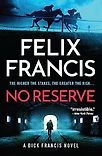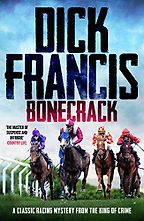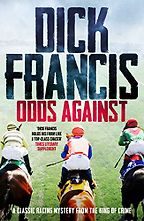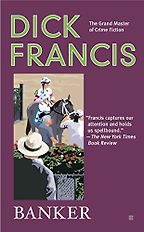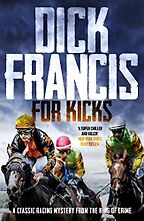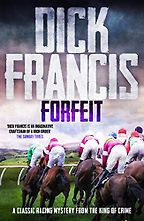I was wondering how you set about picking these books because your father wrote a lot. How many thrillers did he write in total?
He wrote 39. The 40th one came out as a Dick Francis book, but I wrote it. Then there were four with both our names on, but I wrote those, too.
He also wrote an autobiography, didn’t he? Tell me a bit about his life and how he got into writing.
The autobiography was his first book. Most people write autobiographies towards the end of their lives, but it was an autobiography of his time racing. Racing is called the sport of kings. Because my father rode for the Queen and the Queen Mother, my father got their permission to call his autobiography The Sport of Queens.
Dad was champion jump jockey in the year I was born. People ask me, ‘What was it like growing up with a famous father?’ And I say, ‘What was it like not growing up with a famous father?’ because he’d been that way since I was born.
I never realised how famous he was until he died. I was in Scotland and the BBC sent a film crew from London to interview me for the six o’clock news that night. He was on the front page of all the newspapers the following day. It was quite a shock and a surprise to me that Dick Francis was as famous as he was because he was just my dad.
What thrust the name Dick Francis from the back pages to the front pages of the newspapers was the Devon Loch episode. Devon Loch was the Queen Mother’s horse, and he was riding it in the Grand National. They were well in front with forty yards to go, and the horse suddenly collapsed underneath my father. To do a Devon Loch means to snatch defeat from the jaws of victory.
The following year, he retired from racing. He was already 36 when Devon Loch collapsed. Most steeplechase jockeys have retired well before that because they hit the ground so often. Steeplechase jockeys live with bruises all the time: they have one or two falls a week. In my father’s day, it was three or four. The horses fell more often because the fences were higher and stiffer.
He went on television to announce his retirement from racing. He’d had a terrible fall at Newbury and broken his wrist and ruptured his spleen, and he was advised by the Queen Mother’s racing manager that it was time to retire. She was worried that he was getting hurt. On Sportsview, Peter Dimmock asked him, ‘What are you going to do now that you’re retiring? Are you going to train horses?’
Dad said, ‘No, I don’t know what I’m going to do. I’ve half-written my autobiography, and we’ll see what happens.’
John Junor (then editor-in-chief of the Sunday Express) saw this television broadcast. He rang up Dad and said, ‘If you’ve half-written your autobiography, you must be able to put a few words together. Would you write six articles for my newspaper about the current racing scene?’
Those six articles went on for 16 years’ full employment. Dad always said that taught him to write. The sports editor would take out any superfluous words because they needed the space for the adverts. Six years later, in 1962, his first novel, Dead Cert, was published.
My father didn’t start being a jockey until he was twenty-six, because he’d spent six years in the Royal Air Force during the war. He started off as an airframe fitter and was sent out to the Western desert in Egypt. Then, he was trained as a pilot. He flew Spitfires, Wellington bombers, and Lancasters. He flew Wellingtons off a little-known Northamptonshire airfield called RAF Silverstone, which they then converted into the Grand Prix circuit.
He always said that riding horses over Becher’s Brook in the Grand National was quite dangerous, but at least no one was shooting at him. The danger of flying Wellington bombers over Germany on bombing raids was infinitely greater.
Did he talk a lot about his World War II experience?
No, not at all. He always said that it robbed him of his best racing years.
The Dick Francis books you’ve chosen for us today are some of the classics. Are they personal favourites?
Bonecrack has always been my favourite book, so that was an easy choice. I was 18 when it was published and it was set in Newmarket. There are all sorts of things about the book which I absolutely loved. It isn’t a whodunit because you know whodunit right from the beginning. It’s a ‘how the hell do I get out of this mess?’ book.
It’s about a father-son relationship. That’s quite poignant for me because of my relationship with my father. I managed his life for more than 20 years, and I took over writing the Dick Francis books.
So for all those reasons, Bonecrack was easy to put as number one on this list. The others were harder to choose.
Can you remind me what happens in Bonecrack?
At the core of the book is the relationship between a father and son who are not very close: the main character, Neil Griffon, doesn’t get on with his father. He hasn’t spoken to his father for a long time before the book starts, but then his father ends up in hospital, having had an accident, and Neil takes over his training yard. He’s a reluctant trainer who then has pressure applied to him.
The pressure is applied by another father, Enzo Rivera, who is a megalomaniac. He will do everything in his power for his son, Alessandro, including threatening people. And his son wants to ride the favourite in the Derby. It’s nonsense of course! Enzo uses force to thrust his son, an inexperienced rider, into the training stable and insists he rides the best horses.
It’s a balancing act, but Neil finds out that Alessandro is not bad at all at riding and encourages him. Enzo has always provided everything for Alessandro. Here, the son is able to do something from his own expertise, and the father doesn’t like it because it’s taking away his son’s reliance on him.
So Bonecrack is really about the relationship between two fathers and two sons, and also how the relationship that grows between the sons affects the relationship between the fathers and the sons. It’s a complex story, but it’s one I adored and have always felt was the best.
Refusal, the book I wrote that was published in 2013, was a homage to Bonecrack. It was the same in that it isn’t a whodunit — you knew whodunit right from the start.
As a teenager I read all the Dick Francis books one summer, as did my sister. I loved horses and I loved thrillers, so it was a good fit. I thought the plots were particularly good. How did he – and you – come up with them?
How do you come up with plots? You go to places, you watch people, and you listen to conversations. Sometimes a plot just hits you and sometimes it takes a while. Sometimes I start a book and I’m not quite sure what the main crime will be. I think it was the same with my father.
It helps that we don’t have the same character going through all of them (though Sid Halley’s been in six books). It makes it easier when you start with a new character. You think of the character first, and the job that the character does, and sometimes that gives you a bit of the storyline.
There are now 56 of them, so it’s more and more difficult to think up something that hasn’t been done before. In my latest book, No Reserve, I decided I’d write about the Newmarket bloodstock sales. They have never been written about in any of the Dick Francis novels (though way back, in 1974, one novel did feature a bloodstock agent). I decided my character would be an auctioneer. That, in itself, is a good step towards getting your plot, because you then look at what an auctioneer does.
Then you think about what scenarios could take place that the character could be involved in — pressure that could be put on them or something they could discover. As I write in No Reserve, racing thoroughbreds and gambling are intertwined, but the biggest gambles occur in the bloodstock sales. Last month I spent three days at the October sales in Newmarket. One horse sold for 2 million guineas! With so much money going around, there always are people that are trying their best to get a cut.
When I’ve read articles about you and your parents, I’ve been struck by how the novels are a family effort. There was your dad, with his experience of racing and horses, who left school at 15; your mum, who studied literature, was in publishing, and became a pilot; and you, coming along and writing as well – with all three of you doing the research.
It was a joint effort. Mum used to polish the prose. I took over partly by accident. There’d been five years with no Dick Francis books. My father’s literary agent said, ‘We need a new hardback because all the backlists are going to go out of print.’ I looked at him and thought, ‘Are you crazy?’ My mother had been dead for five years by then, and my father was eighty-five. To write a book, one thing you need is a good memory, and his memory was failing him. I said, ‘You’re not going to get one.’
He said, ‘I’m asking your permission to get an established crime writer to write a Dick Francis novel, just to stimulate the backlist.’ Well, I must have had a few glasses of red wine by then and I said, ‘Before you ask anyone else, I’d like to have a go.’
He didn’t roll his eyes or laugh. He simply said, ‘I’ll give you two months to write two chapters, and then we’ll see.’ He openly admitted afterwards that he thought he’d get the permission he was seeking after those two months. But when I sent him the two long chapters that I’d written, he said, ‘There are two things you’ve got to do. You’d better get on and finish it, and you’d better go and talk to your father.’
Dad was not in favour to start with. But then, when I finally talked him into reading the chapters I’d written, he was very excited. Under Orders was the result. In my view, if it was going to stimulate the backlist, it had to have Dick Francis on the cover. It didn’t have my name on the cover at all. It sold, of course it did – it had Dick Francis on the cover. But I was afraid that all the reviews would say that Dick had lost it. Fortunately, they didn’t. They said, ‘The master is back.’
After that, I started writing Dead Heat. You might say that I’ve done one a year ever since. No Reserve is number seventeen, and I’m already working on number eighteen.
When Dead Heat came out, the American publishers took fright, so it had “Dick Francis” in big letters on the cover and underneath, in the smallest font they could find, “and Felix Francis.” If you look at No Reserve, my name has gotten bigger, but his is still there. I call them Dick Francis novels. That is my choice. I feel that Dick Francis is now a brand, and that he is still as much a part of my books, as I now feel a part of his. The best news is that all the Dick Francis backlists are still in print, so I must be doing something right.
Maybe it’s time I reread them.
Some of them are a little bit out of date in terms of the technology. Nowadays all horses are microchipped and all foals are DNA-tested so some of the things that went on, for example in a book like Blood Sport, you couldn’t do any longer. You couldn’t kidnap a stallion because you could never use it: the DNA would show that it was not the stallion everyone thought it was. Also, the money amounts are quite amusing in some of the early novels because the value of money is different.
But the stories stand the test of time. I always say to people, ‘You don’t need another author! Just read these. By the time you get to the end, you can start again at the beginning.’
Shall we move on to Odds Against? Why did you pick out this one?
Sid Halley makes his first appearance in Odds Against. He was never intended to be a recurring character. My father had no intention of writing about him again, but Yorkshire Television did a series in the late 70s called The Racing Game, and they used Sid Halley as the character.
My father suddenly felt that he had to write another Sid Halley book to come out when the TV series aired, so he set about writing Whip Hand. Sid became the first character to have been in two books. In fact, Sid’s now been in four more books. I’ve written three of them. When I took over, the first one I wrote had Sid Halley in it. It was easier for me to use an existing character to write a Dick Francis novel than to create a new one.
If somebody hasn’t read Odds Against, why is it a good one?
In a lot of my father’s (and my) books, you have an investigator who’s an amateur, a reluctant investigator. Sid was a champion jockey, but his hand was very badly injured when a horse landed on it. The horse’s trainer had saved a bit of money by reusing racing plates and that had led to the damage to Sid’s hand. He had to stop riding and didn’t know what to do. He’s offered a job as an advisor at a private detective agency which has a racing section, but Sid doesn’t do much. He sits around the office.
Before long, Sid finds himself involved in an investigation. I love the first line of Odds Against:
“I was never particularly keen on my job before the day I got shot and nearly lost it, along with my life.” Always grab the reader on the first line! People in bookshops read the first page —don’t let them put the book back on the shelf.
I loved the idea of Sid. His father was a window cleaner who fell off his ladder and died before Sid was born. His parents were engaged but hadn’t gotten married by that stage, so he’s illegitimate. Sid didn’t know anything about horses, but when he was sixteen, his mother was dying of cancer and she deposited him at a racing stable, simply because he was small. He turned into a champion jockey.
Odds Against came out in 1965. Interestingly, Willie Carson, the many-times champion jockey and Derby winner, had a similar story in that he had no contact with horses at all, but his mother sent him off to a racing stable because he was small. Reality is always reflected, either before or after, in a Dick Francis novel. They say truth is stranger than fiction. If I’d written a book that had Devon Loch collapsing forty yards from the winning post, everyone would say, ‘Don’t be stupid.’ And yet, it happened.
He’s a very memorable character, Sid. I must have read Odds Against in about 1983, but I do remember him.
There’s that wonderful bit at the beginning where he goes to stay with his ex-father-in-law, Charles. When they first met, Charles didn’t think Sid was up to much. Sid left school early, much the same as my father had. It doesn’t mean you’re not clever. Sid beats him at chess, and suddenly his father-in-law sits up and takes notice. Later, when Sid divorces his wife, Jenny, he stays friends with her father.
Sid is invited by Charles to come down for the weekend. The other houseguests are all told that the dinner is black tie, but Charles doesn’t tell Sid. The picture of Sid riding, which normally hangs on the dining room wall, has been replaced. It’s all because Charles thinks that the people staying with him are villains and he wants Sid to investigate them. He’s trying to get them to underestimate Sid in the same way he had underestimated him initially.
But Sid doesn’t know anything about it. I love that. You can feel Sid squirming in his seat and wondering how his father-in-law could be so cruel. He knows it must all be for a reason, so he doesn’t say anything. He just lets it happen to him.
It’s the book that established Sid’s character, which both my father and I went on to use again and again.
Let’s go on to Banker. The main character is a merchant banker (or investment banker, I guess we’d call him now). I remember this one had a really clever plot, partly set in the world of finance. How did your father pull that off?
I remember being at the Cheltenham Races with my parents in around 1981. At that time, I was a teacher at Pate’s Grammar School in Cheltenham and they were staying with me. My father was driving, my mother sat in the front seat, and I was sat behind.
At one point, we were invited into someone’s box for a drink. We spent quite a lot of the afternoon there and one of the people that my father was introduced to was a man called Michael Melhuish. He was a merchant banker who arranged loans for businesses and what have you and we had a nice time chatting to him.
My father always liked to leave during the last race to avoid the traffic. He hated sitting in traffic jams and going in and out of Cheltenham racecourse can be quite difficult. So we left as the last race was running. He was about to start the car when he said, ‘I’m just going back. I want to ask a question. I won’t be long.’
Mum and I just sat in the car, waiting as the car park emptied around us. There were no mobile phones, so you couldn’t ring up and say, ‘Where are you?’ We were there for an hour and a half.
Dad had gone back to the merchant banker and asked, ‘Would you lend me a million pounds to buy a stallion?’ A million pounds was a lot more in 1981 than it is today. So they sat down and went through all the details. The merchant banker didn’t realise it was research for a plot. He only found out when he asked, ‘What is the name of the stallion?’ And my father said he didn’t know yet.
[SPOILER]
That was the basis of the book. Tim Ekaterin is a merchant banker, and someone asks to borrow a million pounds to buy a stallion. The whole thing starts to go wrong because the offspring of the stallion start being born deformed.
It’s a wonderful story but I don’t think I ever forgave my father for killing off Ginnie. As he said, at least she died happy because she’d worked out why it was happening and she knew it wasn’t anything to do with the stallion.
So that was Banker. I love the intricacies of the relationships. You said you loved horses, but none of these books are about horses. They’re about people. Racing is simply the canvas against which we paint the human stories. C. P. Snow once wrote a review of one of my father’s books and said, ‘To not read Dick Francis books because you don’t like horses is like saying you don’t read Dostoevsky because you don’t believe in God.’
Let’s move on to For Kicks. This is another very memorable one.
“The Earl of October drove into my life in a light blue Holden that had seen better days, and danger and death tagged along for the ride.” That’s the first line of For Kicks.
The main character is Daniel Roke. He’s English but he moved to Australia. There is something going on at the Jockey Club (nowadays called the British Horseracing Authority) and they want to bring over someone they know is not involved to investigate.
I really loved that book. Daniel ends up being a stable lad. When I wrote Triple Crown in 2016, my protagonist, Jefferson Hinkley, is recruited to go undercover and ends up acting as a groom in a stable yard in Belmont Park in New York. That book was my homage to For Kicks.
For Kicks was the first book I read of the Dick Francis novels. I was twelve when it was published. I only went back and read the earlier books, like Dead Cert (1962), afterwards. I started with For Kicks, and, as they say, you never forget your first time.
I loved the whole premise. It was a very close call as to whether to put For Kicks higher up on this list but, for all the reasons I mentioned, Bonecrack is my favourite. The others could be in any order, really.
I remember loving For Kicks when I read it, at probably the same age as you were. But how was it reading these books when you’d been involved in the research?
I wasn’t in on the research for the early ones, because I was too young. The first research I did was designing the remote-controlled bomb that blew up the aeroplane in Rat Race (1970). My physics teacher and I built it in the science labs at Mill Hill School — not the explosive bit, just the remote control. Nowadays everyone uses infrared remote controls — for your TV, your garage door, your car key fob — but back in 1970, there weren’t many. The one we built was made of solenoids and magnets.
How was it decided that a radio-controlled bomb detonator was critical for the plot?
It was the summer, and we were on holiday down in Devon. My father was talking with my mother about how you could set off a bomb by remote control. He didn’t want it to be on a timer — he wanted it to happen at a specific moment. I must have said, ‘You just need switches that are controlled by radio and magnets and solenoids’ and he asked if I could find out for him. So when I went back to school in September, I went to see my A-level physics teacher and we made it. That was the first bit of research I did for a Dick Francis novel, but I did quite a lot of others.
If you go to 1981, Twice Shy, I wrote the computer programme in that book. By then I had done computer studies and electronics at university. It was quite cutting edge at the time, but it’s out of date and embarrassing now.
The final book is Forfeit. Again, there’s some personal experience because like the main character, your dad was a columnist for a newspaper.
Yes, he was a columnist for the Sunday Express, but it’s more than just that. In Forfeit, James Tyrone’s wife has polio and has a Spiroshell breathing system. It’s very personal because my mother had polio when she was 26. She spent eight weeks in an iron lung that did the breathing for her. She did recover, but her breathing was never very good. In an English winter, she used to take to her bed in November and reappear in April.
One year, my parents spent some time in Penang in November. Dad was spending a lot of time there talking to Lester Piggott, because he was writing his biography. That winter my mother wasn’t unwell at all. So they decided that they would go off somewhere warm for the winters.
They bought a place in Florida for the winters to start with, but the American government changed the rules and said that unless you lived there permanently, you could only stay for three months. So my parents took the difficult decision to leave the United Kingdom and lived in Florida for a while.
My mother was very well after that, so it was a good move. She died of a heart attack at age 76. If anyone had told me that when I was growing up, I would have said, ‘Don’t be ridiculous, she’ll never live that long’ – because I had seen her come close to death on so many occasions.
In Florida, they got involved in the politics of condominiums, which they didn’t like. They went on holiday down to the Caribbean and while they were there, my mother bought an apartment and they moved down there. My parents are now buried side by side, near their home in the Cayman Islands. My father got to 89. They had a very good life. They were married for 53 years, so they had a wonderful time.
Forfeit was written when my father was still writing weekly articles for the Sunday Express. It was written in 1968, and it was the first book of his to win the Edgar Allan Poe Award in the US. He’s still the only person to have won three Edgar Allan Poe Awards for best novel.
It’s a good story. it’s all about someone applying pressure to make someone do what they don’t want to do. That is a recurring storyline in this series of thrillers.
Was he a big reader of thrillers?
He was a voracious reader of all sorts of things, mostly to do with racing, but yes, he loved thrillers. He was very much influenced by The Calendar by Edgar Wallace. He also became friends with many crime writers. He was a member of something called ‘the Detection Club,’ of which I am now a member. He lived in what is now South Oxfordshire, where I grew up, and the president of the club lived in Wallingford, which is not very far. Her name was Agatha Christie.
When I got my driving license, aged 17, I’d drive my father there and I used to go in and make tea for them. What would I give now to have the opportunity to have just one of those visits again and to talk to her? I’d always get banished to the kitchen to make tea, so I used to chat with her husband, Max. He’d regale me with exciting stories of Egypt: he was an archaeologist.
I read a great number of thrillers. I loved adventure stories more than straight detective novels. I loved Alistair Maclean and used to wait for his books to come out. And Desmond Bagley. I try and write books now that aren’t detective stories, they’re adventure thrillers.
The other books I loved as a child was Arthur Ransome, the Swallows and Amazons series. My favourite was We Didn’t Mean to Go to Sea, set around the Norfolk Broads. When I became a father, I used to read them to my children as bedtime stories, chapter by chapter. I loved those books. I used to go and spend all my pocket money at the Colophon bookshop, in Wallingford, buying every copy of Arthur Ransome I could find.
They’re wonderful stories. They were written in the 1920s and 1930s, and I was reading them in the 1960s. It never seemed a worry to me to be reading about something that was a little bit old, so I hope that people reading the early Dick Francis novels are not worrying about the fact that they were published sixty years ago. They stand up.
No Reserve by Felix Francis is published by Zaffre at £20
Interview by Sophie Roell, Editor
November 5, 2023. Updated: June 28, 2025
Five Books aims to keep its book recommendations and interviews up to date. If you are the interviewee and would like to update your choice of books (or even just what you say about them) please email us at [email protected]
Five Books interviews are expensive to produce. If you've enjoyed this interview, please support us by donating a small amount.

